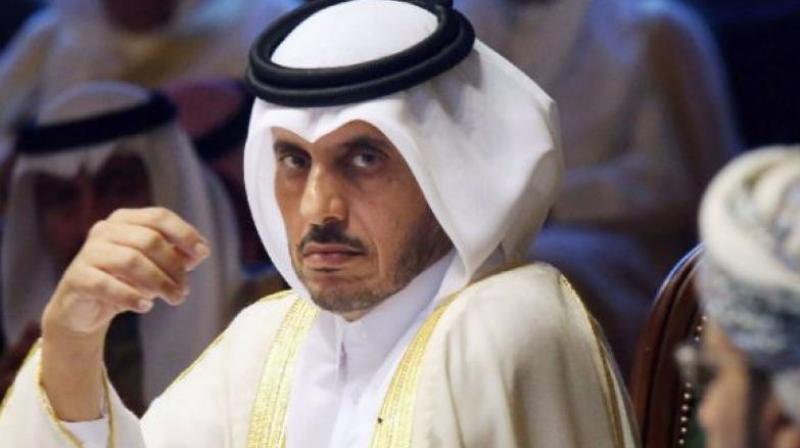Qatar crisis redraws red lines and frays age-old Gulf ties
The crisis has also upended some red lines, making what was once illegal now legal, and vice-versa.

Dubai: It's early morning at a fishing port in Dubai. A group of mostly retired fishermen are playing cards, eating dates and drinking coffee at the port's majlis, a traditional meeting space.
Here, the Emirati fisherman say they aren't too worried about the political fallout with Qatar that's gripped the region since early June, when Saudi Arabia, the United Arab Emirates, Bahrain and Egypt cut ties with the small Gulf state, accusing it of supporting extremists.
"When it comes to politics, it's not our business," Thani Obeid said. "If everyone walks around saying their opinion there will be chaos."
Obeid, 65, and Salem Jomaa, 70, say they have faith in the "wisdom" of the region's rulers because "we are one family."
"The Gulf is one home. From Saudi Arabia to Ras al-Khaimah (in the UAE) to Oman. We are all brothers, cousins, friends," Jomaa said. "We are all Muslims."
Centuries-old ties that bind families to tribes and tribes to ruling sheikhs underpin the Arabian Peninsula, but that kinship is now under strain.
The crisis has also upended some red lines, making what was once illegal now legal, and vice-versa.
Chief among them was an understanding - enshrined in tradition and government enforced - that criticism of another Gulf country or its esteemed ruler could lead to automatic imprisonment and hefty fines.
After the row erupted June 5, those rules changed. Saudi Arabia, the UAE and Bahrain warned instead that anyone who sympathizes with Qatar or criticizes the measures taken against it would be imprisoned and fined.
Qatari citizens were also expelled from the three countries after years of visa-free travel throughout the Gulf. Transport links with Qatar were cut and Saudi Arabia sealed shut Qatar's only land border, impacting food imports.
Saudi and Emirati officials insist the measures are not aimed at Qatari citizens, but at the government. That distinction has meant little to Qataris who say the blockade on their country and the assault on their leadership is like an attack on the whole society.
"If they talk about our emir, it's like they are talking about us. The siege and blockade and making it illegal to sympathize with Qatar, this is against us," Ahmed al-Khayli, a 36-year-old Qatari said.
Speaking by phone from Qatar, al-Khayli said he believes the relationship between Qataris and others in the Gulf has become "more sensitive."
Many Qataris - who number around 270,000 citizens - believe their small, energy-rich country is standing up for itself, refusing to surrender its sovereignty. Patriotic fervor has swept through the country. Towering images of its 37-year-old ruling emir, Sheikh Tamim bin Hamad Al Thani, are plastered on cars, billboards and storefronts across the capital.
In Qatar and the UAE, where foreigners far outnumber locals, many talk with sincere admiration for their rulers. It's a relationship that harkens to a time when tribal elders were responsible for the security of their communities, which relied on pearl diving and fishing for survival. Then, as now, tribes in the Arabian Peninsula intermarried.
The expulsion of Qataris separated mixed-nationality families, parents from their children and husbands from their wives. After public outcry, the three Gulf countries said exceptions would be made for immediate family members, though rights groups say students and families are still being affected.
Hamad al-Kulaib, a 38-year-old Kuwaiti businessman, said the crisis "feels like a battle of the egos" between high-ranking officials. Kuwait, which has remained neutral, is trying to mediate the crisis.
"The tension between Qatar and the Saudi-led bloc is certainly putting all our social relationships in danger," he said.
Though there have been fallouts in the past between Gulf states, this is the most severe crisis in decades.
Saudi and Emirati media have unleashed a barrage of critical reports about Qatar, accusing it of sedition, lying, sponsoring terrorism and trying to destabilize the region. Qatar's support of opposition Islamist groups and its ties with Iran has unnerved its neighbors. Qatar says accusations it backs extremist groups are politically motivated and denies it has ever sponsored terrorism.
Meanwhile, Qatari-affiliated press upped their critical coverage of Saudi Arabia since the row erupted. Qatar and the UAE have also traded accusations of hacking.
In the years before the crisis, state-linked news channels and papers did not criticize a fellow Gulf nation's ruler or policies.
Officially, at least, Qatar has kept a modicum of decorum in place. The emir congratulated the Saudi king and his son, Prince Mohammed bin Salman, when he was elevated to crown prince in late June. The emir also sent a cable of condolences to King Salman on the death of his elder brother.
Those acts sparked a hashtag on Twitter in support of Qatar, and another hashtag said Saudis still welcome ties with Qatari citizens. Twitter is also where people have rallied behind their governments.
Emirati social media star Taim al-Falasi hit back at accusations that citizens in the UAE were being paid to support the moves against Qatar. In a fiercely-worded post, she asked Qataris how they could continue to support their emir after all the allegations made against Qatar.
At the majlis in Dubai's harbor, the fishermen shake their heads when the mention of Twitter comes up. They disapprove of the fierce words being traded online.
"If you add fuel to a fire, the fire will grow," Obeid said.
In Kuwait, 27-year-old Barrak al-Dakhail says the crisis has polarized opinions there and made relationships among people in the Gulf "awkward."
"If the situation continues to escalate, it might create a bigger wedge between the people ... and that's certainly something we don't want," he said.

